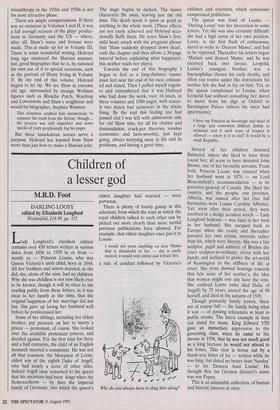Children of a lesser god
M.R.D. Foot
DARLING LOOSY edited by Elizabeth Longford Weidenfeld, £16.99, pp. 325 Lady Longford's excellent edition contains over 450 letters written at various dates from 1856 to 1939 to or from mostly to — Princess Louise, who was Queen Victoria's sixth child, born in 1848. All her brothers and sisters married, as she did; she, alone of the nine, had no children. Why she was childless is not now likely ever to be known, though it will be clear to the reading public from these letters, as it was clear to her family at the time, that the original happiness of her marriage did not last. She gave up loving her husband well before he predeceased her.
Some of her siblings, including her eldest brother, put pressure on her to marry a prince — protestant, of course. She looked over the available protestant princes, and decided against. For the first time for three and a half centuries, the child of an English monarch married a commoner. He was not all that common: the Marquess of Lorne, eldest son of the eighth Duke of Argyll, who had nearly a score of other titles. Indeed Argyll once remarked to the queen that his ancestors had been kings when the Hohenzollerns — by then the imperial family of Germany, into which the queen's eldest daughter had married — were parvenus.
There is plenty of family gossip in this selection, from which the tone in which the royal children talked to each other can be picked out more clearly than more tactful previous publications have allowed. For example, that eldest daughter once put it to Louise:
I would not press anything on dear Mama that is distasteful to her — she is easily excited, it would only annoy and irritate her,
a rule of conduct followed • by Victoria's Why do you always have to drag him along? children and courtiers, which sometimes exasperated politicians.
The queen was fond of Louise 'Darling Loosy' was her invocation in some letters. Yet she was also certainly difficult: she had a high sense of her own position. Lorne, in the first flush of enthusiasm, dared to write to 'Dearest Mama'; and had to be reproved. Thereafter his letters began `Madam and dearest Mama' and he was received back into favour. Leopold, Louise's youngest brother, was a haemophiliac (hence his early death), and often ran restive under the restrictions his mother felt she had to lay on him. Yet, as the queen complained to Louise, when Leopold had without consulting her dared to move from his digs at Oxford to Kensington Palace (where his sister had apartments): I have my Position as Sovereign and head of a large and somewhat difficult family to maintain and if such want of respect is allowed — where is it to end? It would be a small Republic.
Several of her children detested Balmoral, where she liked to have them round her; all seem to have detested John Brown, one of her favourite servants. From both, Princess Louise was rescued when her husband went in 1878 — on Lord Beaconsfield's recommendation — to be governor-general of Canada. She liked the country, and the people; one province, Alberta, was named after her (her full forenames were Louise Caroline Alberta). Yet, soon after their arrival, they were involved in a sledge accident which — Lady Longford believes — was fatal to her trust in her husband. She escaped back to Europe when she could; and thereafter pursued her own artistic interests rather than his, which were literary. She was a fair sculptor, pupil and admirer of Boehm the court sculptor-in-ordinary; clever with her hands; and inclined to prefer the art-world of Kensington to the stiffness of life at court. She even showed leanings towards that bete noire of her mother's, the idea that women might one day have the vote. She outlived Lorne (who died Duke of Argyll) by 25 years, passed the age of 90 herself, and died in the autumn of 1939.
Though primarily family letters, these are of course full — the family being what it was — of passing references at least to public events. The latest example in time can stand for many. King Edward VIII gave an immediate impression to the governing class, when he came to the throne in 1936, that he was not much good as a king because he would not attend to his boxes. This view is borne out by a thank-you letter of his — written while he was king, but dated no better than 'Sunday' — to his 'Dearest Aunt Louise'. He thought that the German dictator's name was von Papen.
This is an admirable collection, of human and historic interest at once.










































 Previous page
Previous page